

Francis Bacon. Francis Bacon, 1st Viscount St.
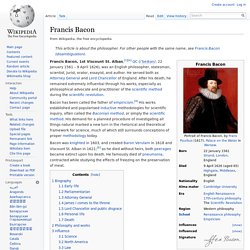
Georg Wilhelm Friedrich Hegel. The birthplace of Hegel in Stuttgart, which now houses The Hegel Museum Georg Wilhelm Friedrich Hegel (German: [ˈɡeɔɐ̯k ˈvɪlhɛlm ˈfʁiːdʁɪç ˈheːɡəl]; August 27, 1770 – November 14, 1831) was a German philosopher, and a major figure in German Idealism.
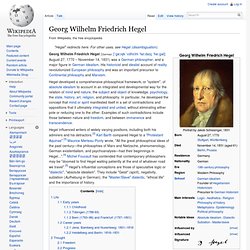
His historicist and idealist account of reality revolutionized European philosophy and was an important precursor to Continental philosophy and Marxism. Life[edit] Early years[edit] Childhood[edit] Hegel was born on August 27, 1770 in Stuttgart, in the Duchy of Württemberg in southwestern Germany. At age of three Hegel went to the "German School".
In 1776 Hegel entered Stuttgart's Gymnasium Illustre. Tübingen (1788-93)[edit] At the age of eighteen Hegel entered the Tübinger Stift (a Protestant seminary attached to the University of Tübingen), where two fellow students were to become vital to his development - poet Friedrich Hölderlin, and philosopher-to-be Friedrich Wilhelm Joseph Schelling. John Locke. John Locke FRS (/ˈlɒk/; 29 August 1632 – 28 October 1704), was an English philosopher and physician regarded as one of the most influential of Enlightenment thinkers and known as the "Father of Classical Liberalism".[1][2][3] Considered one of the first of the British empiricists, following the tradition of Sir Francis Bacon, he is equally important to social contract theory.
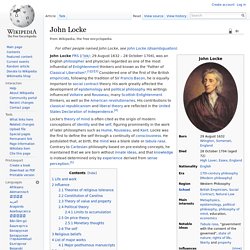
His work greatly affected the development of epistemology and political philosophy. His writings influenced Voltaire and Rousseau, many Scottish Enlightenment thinkers, as well as the American revolutionaries. His contributions to classical republicanism and liberal theory are reflected in the United States Declaration of Independence.[4] Life and work Locke's father, also called John, was a country lawyer and clerk to the Justices of the Peace in Chew Magna,[6] who had served as a captain of cavalry for the Parliamentarian forces during the early part of the English Civil War. Influence. A. C. Grayling. Anthony Clifford "A.

C. " Grayling (born 3 April 1949) is a British philosopher. Bertrand Russell. Russell led the British "revolt against idealism" in the early 20th century.[58] He is considered one of the founders of analytic philosophy along with his predecessor Gottlob Frege, colleague G.
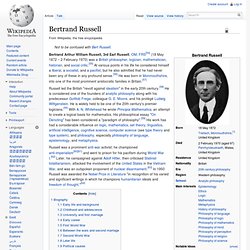
E. Moore, and his protégé Ludwig Wittgenstein. He is widely held to be one of the 20th century's premier logicians.[55] With A. N. Whitehead he wrote Principia Mathematica, an attempt to create a logical basis for mathematics. Mochus. Isaac Causabon, John Selden, Johannes Arcerius, Henry More, Ralph Cudworth, Robert Boyle, and Isaac Newton identified Mochus with Moses the Israelite lawbringer.[7] Jump up ^ Diogenes Laërtius, i. 1; cf. the Suda, ω 283, which calls him OchusJump up ^ Athenaeus, iii. 126Jump up ^ Strabo, Geographica, xvi.Jump up ^ Josephus, Ant.
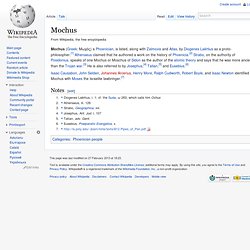
Jud. i. 107Jump up ^ Tatian, adv. Gent.Jump up ^ Eusebius, Praeparatio Evangelica, x.Jump up ^ Karl Wilhelm Friedrich Schlegel. Friedrich Schlegel in 1801 Karl Wilhelm Friedrich (after 1814: von) Schlegel (10 March 1772 – 12 January 1829) was a German poet, literary critic, philosopher, philologist and indologist.
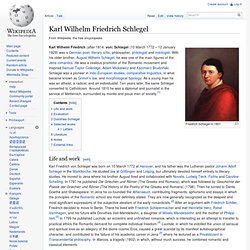
John Stuart Mill. John Stuart Mill, FRSE (20 May 1806 – 8 May 1873) was an English philosopher, political economist and civil servant.
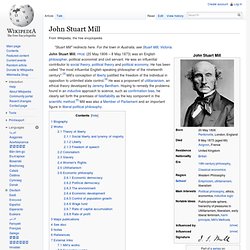
He was an influential contributor to social theory, political theory and political economy. He has been called "the most influential English-speaking philosopher of the nineteenth century".[3] Mill's conception of liberty justified the freedom of the individual in opposition to unlimited state control.[4] He was a proponent of utilitarianism, an ethical theory developed by Jeremy Bentham. René Descartes. Descartes laid the foundation for 17th-century continental rationalism, later advocated by Baruch Spinoza and Gottfried Leibniz, and opposed by the empiricist school of thought consisting of Hobbes, Locke, Berkeley, and Hume.
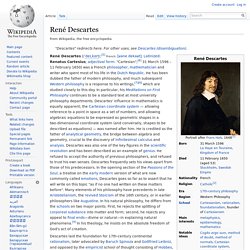
Leibniz, Spinoza and Descartes were all well versed in mathematics as well as philosophy, and Descartes and Leibniz contributed greatly to science as well. His best known philosophical statement is "Cogito ergo sum" (French: Je pense, donc je suis; I think, therefore I am), found in part IV of Discourse on the Method (1637 – written in French but with inclusion of "Cogito ergo sum") and §7 of part I of Principles of Philosophy (1644 – written in Latin). Early life[edit] Descartes was born in La Haye en Touraine (now Descartes), Indre-et-Loire, France. When he was one year old, his mother Jeanne Brochard died. Thomas Hobbes. Though on rational grounds a champion of absolutism for the sovereign, Hobbes also developed some of the fundamentals of European liberal thought: the right of the individual; the natural equality of all men; the artificial character of the political order (which led to the later distinction between civil society and the state); the view that all legitimate political power must be "representative" and based on the consent of the people; and a liberal interpretation of law which leaves people free to do whatever the law does not explicitly forbid.[3]
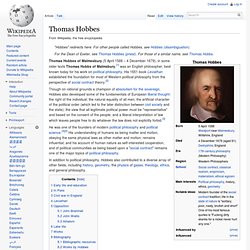
Friedrich Nietzsche. Karl Marx. Karl Marx[note 1] (/mɑrks/;[4] German pronunciation: [ˈkaɐ̯l ˈmaɐ̯ks]; 5 May 1818 – 14 March 1883) was a German philosopher, economist, sociologist, journalist, and revolutionary socialist. Marx's work in economics laid the basis for much of the current understanding of labour and its relation to capital, and subsequent economic thought.[5][6][7][8] He published numerous books during his lifetime, the most notable being The Communist Manifesto (1848) and Das Kapital (1867–1894). Born into a wealthy middle-class family in Trier in the Prussian Rhineland, Marx studied at the Universities of Bonn and Berlin where he became interested in the philosophical ideas of the Young Hegelians. After his studies he wrote for Rheinische Zeitung, a radical newspaper in Cologne, and began to work out the theory of the materialist conception of history.
Early life[edit] Childhood and early education: 1818–1835[edit]
Ludwig Wittgenstein. Immanuel Kant. Immanuel Kant (/kænt/;[1] German: [ɪˈmaːnu̯eːl kant]; 22 April 1724 – 12 February 1804) was a German philosopher who is widely considered to be a central figure of modern philosophy. He argued that fundamental concepts structure human experience, and that reason is the source of morality. His thought continues to have a major influence in contemporary thought, especially the fields of metaphysics, epistemology, ethics, political philosophy, and aesthetics.[2] Kant's major work, the Critique of Pure Reason (Kritik der reinen Vernunft, 1781),[3] aimed to explain the relationship between reason and human experience. With this project, he hoped to move beyond what he took to be failures of traditional philosophy and metaphysics.
Martin Heidegger. Martin Heidegger (German: [ˈmaɐ̯tiːn ˈhaɪdɛɡɐ]; 26 September 1889 – 26 May 1976) was a German philosopher, widely seen as a seminal thinker in the Continental tradition, particularly within the fields of existential phenomenology and philosophical hermeneutics. From his beginnings as a Catholic academic, he developed a groundbreaking and widely influential philosophy. His relationship with Nazism has been a controversial and widely debated subject. For Heidegger, the things in lived experience always have more to them than what we can see; accordingly, the true nature of being is “withdrawal”. The interplay between the obscured reality of things and their appearance in what he calls the “clearing” is Heidegger's main theme.
The presence of things for us is not their being, but merely their being interpreted as equipment according to a particular system of meaning and purpose. It has been suggested[by whom?] David Hume.